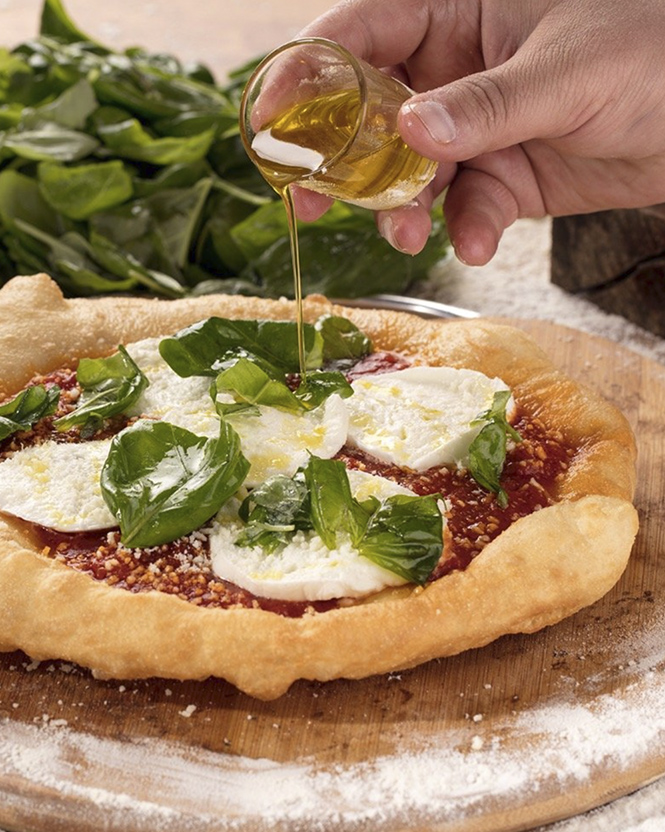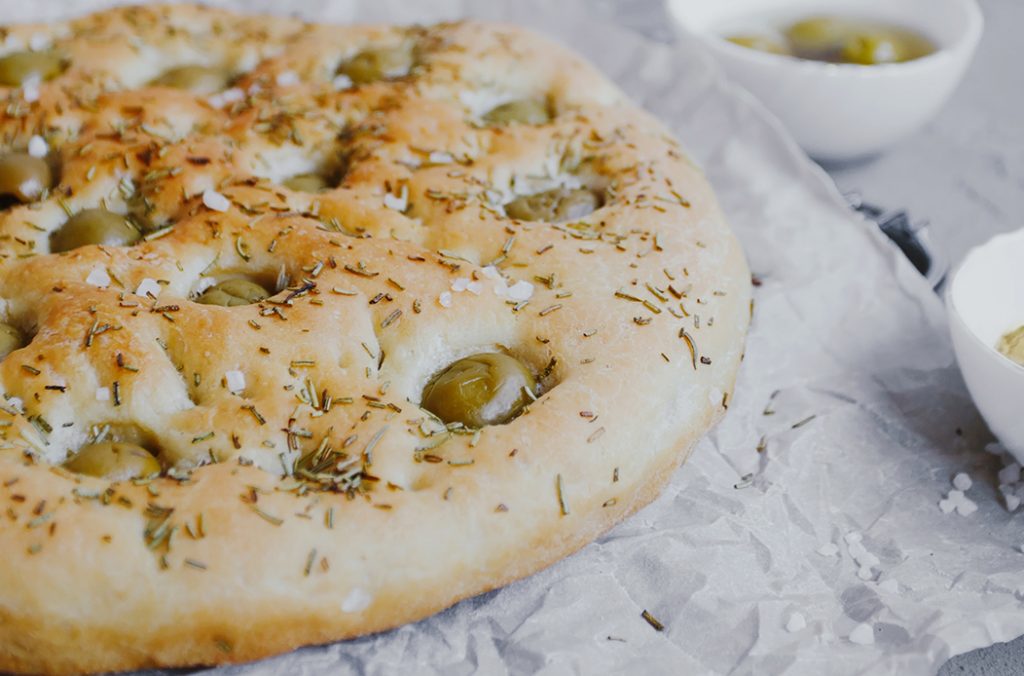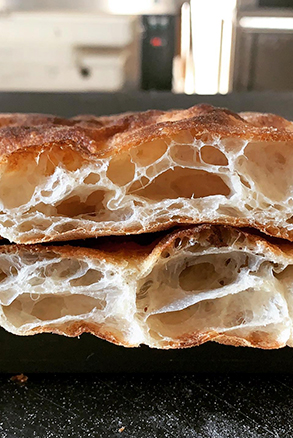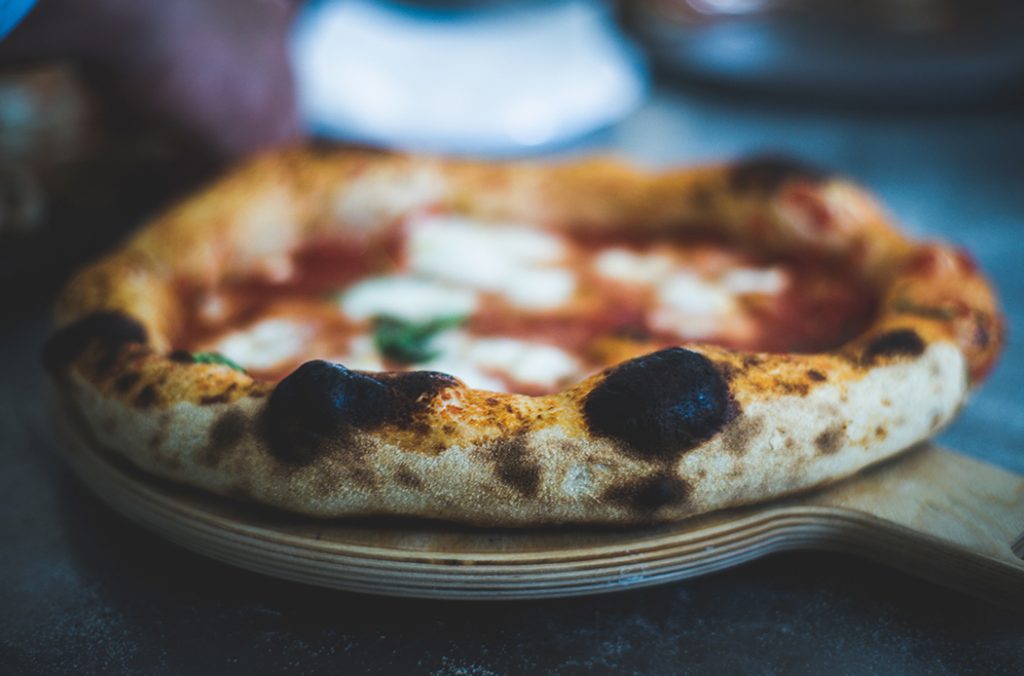TULLIO MONALDI
ANDREA CESARONE
NICOLA ASCANI
Diego Vitagliano
A Neapolitan born in 1985, he is part of the new generation of young Neapolitan pizzaiolos. His pizza carries the Neapolitan tradition into the contemporary world with extensive research into the dough and raw materials.
To date, he has been awarded numerous accolades: 3 slices for the Guida Pizzerie d’Italia Gambero Rosso 2022, Special Award ‘I Maestri dell’Impasto’ in the Guida Pizzerie d’Italia Gambero Rosso 2022, 2nd position in the 50 Top Pizzas in 2021, 3 pizzas for the Guide de L’Espresso 2020, Pizzaiolo of the year for Il Mattino 2019, The Young Pizzaiolo of the Year for the Guida I Sapori di Repubblica 2018 and in the Dissapore Top 30 in 2018.



Diego Vitagliano started experimenting with the pizza a canotto, the one with the high crust, which is reminiscent of the Vomero pizza of about 50 years ago, using different techniques than normal for its preparation (such as those used for bread, indirect doughs with biga or poolish).
At the time, this was considered a passing fad destined to disappear quickly, but today we can say that this was to be the future of Neapolitan pizza.
His first pizzeria opened in 2016 on the Pozzuoli seafront and soon became too small. So, the following year he moved to Naples, in the Bagnoli district, with his first 10Pizzeria Diego Vitagliano, to be followed by a second one opening in April 2019 in Pozzuoli.
Ezio Rocchi
Ezio Rocchi was born in Genoa in 1966 and entered the bread-making world at a young age, working his way up through the ranks in his family’s bakery and then in the famous Senno bakery in Chiavari to learn all the secrets of that noble art.
In 1995, he was ready to buy his first bakery, the Spiga d’Oro in Riva Trigoso, which he managed so expertly that he tripled its turnover in just three years. In that period, he decided to attend marketing and communication courses that led him to found a communication school together with other colleagues in 2005. In the same year, he opened a new Spiga d’Oro, this time in the centre of Sestri Levante: a place with a laboratory specialising in the typical Genoese focaccia.



It was so successful that he decided to concentrate on the second shop only in 2010. This was a wise choice because, from a retail outlet, the Spiga d’Oro in Sestri transformed into a small company capable of producing 250 kg of typical Genoese focaccia and the same amount of bread every day. To achieve this result, Ezio adopted new production strategies by working on biga and sourdough starters.
In 2011, he attended Piergiorgio Giorilli’s courses at Molino Grassi, became his assistant and decided to become a trainer. The definitive turning point came in 2012: he also sold his shop in Sestri to become a manager exclusively, in the dual role of trainer and business consultant. This choice led him to create, with Molino Grassi, an innovative blend suitable for the preparation of Ligurian focaccia.
Pierluigi Sapiente
Born in 1993, Pierluigi Sapiente began his journey into the world of confectionery through… punishment.
Strange, of course, but that’s the way it was. At 14, he was sent by his mother Silvana (as a punishment) to a small pastry shop in Bologna, to work as an assistant.



There, Pierluigi began to develop a passion for his surroundings and in a short time went from dishwasher to apprentice, enrolled at the Fomal institute, graduated as a pastry chef and continued his apprenticeship, which soon saw him become head pastry chef at the prestigious ‘Regina di Quadri’ pastry shop in Bologna, where he was in charge of the product lines for seven years.
He then decided to pursue a career as a freelancer. He studied chocolate-making in Belgium, met maestros such as Iginio Massari and Gino Fabbri, and began various collaborations with leading companies in the sector, first and foremost Molino Grassi, where he continues to carry out research and development. It is from the latter that Pierluigi’s personal product lines of flour were founded, which he uses to create his products, in particular leavened products which are the strong point of this young pastry chef’s production.
Alongside his research and development, he has taken part in several competitions, including: Best Pastry Chef Eurovo 2012 and Sigep Gelato d’oro 2019 selection, in which he came first. He was also awarded the best pastry chef under 35 at World Pastry Stars 2019, presenting the ‘Parmula’ cake.
In 2019 he wrote the book “Spontaneous fermentation in bakery products” with Carlo di Cristo, Ezio Marinato and Cristian Zaghini, published by Italian Gourmet.
Cristian Zaghini
At the beginning of his career, Cristian Zaghini worked as an apprentice pizzaiolo near his home town of Salara, and from 1992 onwards as the head pizzaiolo in important restaurants and pizzerias on the Romagna Riviera.



His passion and his desire for the continuous and constant search for perfection in doughs drove him to study everything related to flour and yeast, so much so that in 1999 he founded a training and events association in the Rimini area with three other colleagues: RiminiPizza, where people can attend a biannual course to become a Pizzaiolo Instructor. And so he entered the world of training in the field of pizzerias for the first time.
After years as a teacher and of various work experience in different pizzerias, he joined the team of a well-known milling company in 2004, where he specialised as a technician and became a trainer at one of the most important schools for pizza on direct, indirect and sourdough techniques.
At the same time, he set up his own company, Consultapizza, which offers consultancy, coaching and training in Italy and abroad. In addition, Consultapizza also handles start-ups, project relaunches and works to improve doughs or search for excellence.
Professional advice helps owners save thousands of euros by purchasing targeted, professional pizza dough equipment and suggesting how to avoid the purchase of superfluous, non-performing equipment.
In the blog, apprentice pizzaiolos can watch many free video clips to learn tips on mistakes to avoid when opening a new pizzeria or expanding the one that they already own and read articles dedicated to the art of baking.
In 2019 he wrote the book “Spontaneous fermentation in bakery products” with Carlo di Cristo, Ezio Marinato and Pierluigi Sapiente, published by Italian Gourmet.